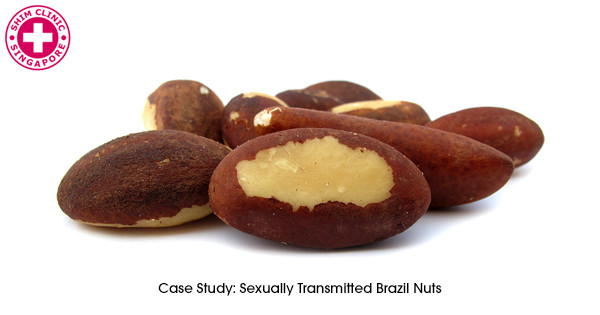Nut allergies are among the most dangerous of allergies, with a high rate of anaphylaxis. Sufferers know to be wary of what they eat. But how many would think to be wary of what their partner was eating?
In 2007, a woman presented at St Helier Hospital in England was suffering from widespread hives and had difficult breathing. She had a known nut allergy but was careful to avoid foods containing nuts. Her partner was very understanding of the condition and though he ate Brazil nuts, was careful to brush his teeth before they kissed.
After exhausting all other leads and knowing that the couple had sex just prior to her symptoms appearing, the doctors at the hospital arranged an experiment. They had the man eat Brazil nuts again and tested his saliva, sweat and semen in a pin prick allergy test on her skin. Tests of the man’s sweat and saliva were negative, but his semen caused a reaction.
Brazil nuts are actually seeds, produced by one of the tallest trees in the Amazonian rainforests. The large nuts are often found in bags of mixed nuts and contain a high vitamin and mineral content and are thought to have the highest content of the nutrient selenium of any food.
Allergy to Brazil nuts are the second most common nut allergy after peanuts and can be life-threatening. There are six proteins shown to be able to cause allergic reactions in people but the main one is known as Ber e 1. It is a small 9 kDa protein which falls into the category of the 2S albumins, a group of proteins common to seeds. Ber e 1 is resistant to digestion and it is the allergen that is able to pass into semen.
To date, Brazil nuts are the only food allergen known to pass into semen and so be sexually transmitted like any other STD. It is advisable to abstain from eating Brazil nuts for 24-48 hours prior to coitus if your partner is allergic. If you have indulged, a condom will provide protection.
If you want more information regarding this case, it was published in The Journal of Investigative Allergology and Clinical Immunology in 2007, Volume 17, issue 3, pages 189-91 by Bensal, et al. entitled “Dangerous liaison: sexually transmitted allergic reaction to Brazil nuts”.

